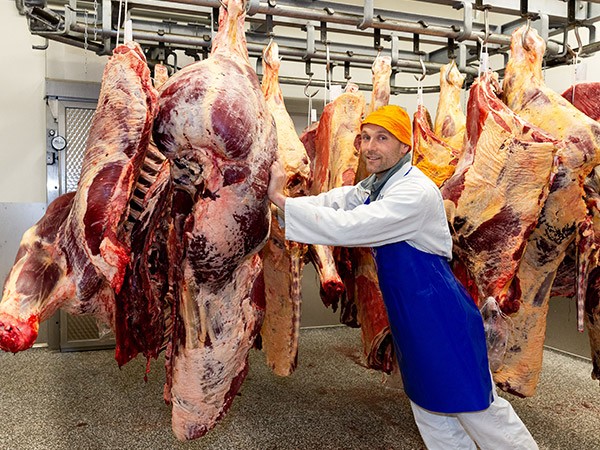
Mark Willems was only 18 when he joined his father’s partnership and was given the opportunity to start a meat-processing company within it: the third generation of a family with a passion for honest meat.
During the Second World War, Mark’s grandfather Piet Willems visited farms in the Gelderland village of Ewijk as a farm slaughter to slaughter cattle on site. He had an eye for quality and maintained high standards in his company. This did not go unnoticed, and was valued: his customer base grew in no time. In 1959 he started the village butcher shop in Ewijk.
His own slaughterhouse, where his customers could bring their animals, was the next step. Piet’s son Peter took over the company with love and expanded it step by step. For grandson Mark Willems it was equally clear: after his education at the butchery school in Arnhem he joined the family business as the third generation. Under his management, the business flourished. ‘We started outgrowing our premises’, Mark recounts. ‘In Ewijk there were no possibilities for expansion: Druten did offer new opportunities. It took some getting used to, as we have our roots in Ewijk, but it is okay now. The municipality of Druten was a peasant party to cooperate with. Together with the maintainers of the former location, the local authorities and a consultancy firm we have drawn up a new plan for a brand new slaughterhouse. When the environmental permits had been applied for and granted, we could actually start working on the future. It was not an easy trajectory’, Mark looks back, ‘but we did it.’ In spite of all innovation and changes the standard values of grandpa Piet were maintained at the new location: ‘Quality and reliability are still the main cornerstones of our company’.
He works closely together with livestock farmers and the cattle traders from the direct vicinity: 'Het Land van Maas en Waal, Het Rijk van Nijmegen, De Betuwe'. ‘By keeping the distances between our suppliers and our company as short as possible, the animals only travel a short distance, which reduces transport stress’, Mark explains. ‘The cooperation is based on mutual trust. There is always good consultation and we keep a keen eye on when the animals are ready for slaughter. The intensive cooperation results in an exclusive piece of meat: full of flavour and of excellent quality’, Mark says. ‘In addition, we also slaughter sheep for third parties.’
The daily nourishment of cows and pigs consists of a balanced menu, composed in close consultancy between the food supplier and the livestock farmers. The food does not contain animal fat. The stables are spacious, provided with straw and have windows for a natural day and night rhythm. The animals are also given ample leeway. Pigs stay longer with their mothers than is customary. Mark: ‘All our efforts are aimed at the animals’ well-being. For this reason, after arrival at our company both cows and pigs are put in the stable for a night to calm down and reduce stress. We do this out of love for the cattle and to get the best possible quality of meat’.
There is a one to one relationship with a vet. ‘All animals are checked with regard to health by a vet upon arrival. After slaughter the inspection of slaughtered animals follows. All data on these processes is included in the Food Chain Information. ‘Better performance through good tracing,’ we call that. It gives our buyers 100 per cent certainty on quality, tenderness and texture of the beef and pork.’
Mark also thinks we should be careful with this world: ‘For this reason, sustainability is also a central thread in our company. I choose very consciously for sustainable quality products, we have led lighting and we practice heat recovery. The energy released during cooling heats up the water that we use for cleaning. The water from our own water source is de-ironed and softened, giving it the status of drinking water quality. We fill the troughs in our stables with it and clean our trucks’.
Mark is optimistic about the future. ‘We notice that both consumers and the parties we cooperate with choose more consciously for quality. For us, this is self-evident. Malpractices such as the ones that are making the headlines in recent years, are totally unfamiliar to us. We are not, and will never be, a mass production company. Quality takes priority over quantity for us. We are known as a progressive supplier of pork and beef. We have three generations with passion for their trade to prove that.’
Source: © Vakblad Voedingsindustrie 2019; Beeld: ©Marcel van Engelenburg